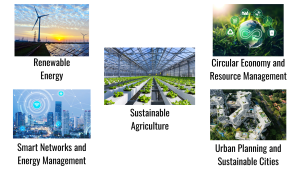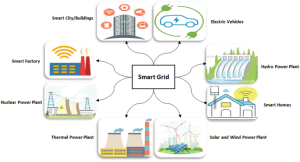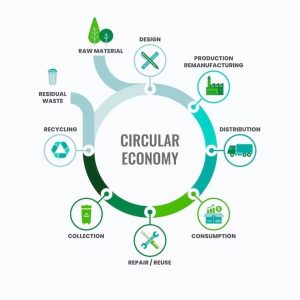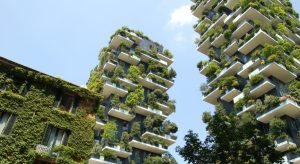content
Bespoke Software Development
April 16, 2024
6 min read
Introduction
Recently, the intersection of technology and sustainable development has become increasingly vital. Humanity faces complex challenges such as climate change, resource depletion and environmental degradation, so the need for innovative solutions is becoming increasingly urgent. Fortunately, technology offers many opportunities to implement green practices and mitigate the impact of human activities on the planet. In this article, our team explores the role of technology in sustainability, and highlights key innovations shaping a more environmentally conscious future.

Renewable Energy
One of the most important contributions of technology to sustainability lies in the field of renewable energy. Advances in solar, wind, hydro, and other renewable energy sources have revolutionised the way electricity is produced. Solar panels, for example, have become more efficient and affordable, making solar energy a viable alternative to fossil fuels in many regions. In addition, innovations in energy storage technologies, such as lithium-ion batteries, address the intermittency problem associated with renewable energy sources, allowing for smoother integration into existing power grids. The transition to renewable energy sources not only reduces greenhouse gas emissions, but also increases energy security and creates new economic opportunities.
Smart Networks and Energy Management

The advent of smart grid technology has ushered in a new era of efficient energy distribution and management. Smart grids use digital communication and control systems to optimise the flow of electricity, minimise losses and balance supply and demand in real time. By integrating renewable energy sources, energy storage systems and smart metres, these smart grids allow consumers to monitor and regulate their energy consumption, resulting in significant energy savings and cost reductions. In addition, by facilitating the integration of electric vehicles and decentralised energy production, smart grids play a critical role in creating a more resilient and sustainable energy infrastructure.
Sustainable Agriculture
Technology is revolutionising the agricultural sector, offering innovative solutions to increase productivity while minimising environmental impact. Precision farming technologies such as GPS-guided tractors and drones allow farmers to optimise resource use, reduce chemical use and minimise soil erosion. In addition, advances in biotechnology, including genetically modified crops and gene editing tools, hold the potential to create resilient crop varieties that can thrive in a changing climate and resist pests and diseases. In addition, digital platforms and data analytics provide farmers with valuable information about weather conditions, market trends and cropping practices, enabling better informed decisions and sustainable farming practices.
Circular Economy and Resource Management

In a traditional linear economy, resources are extracted, processed, used and disposed of, resulting in resource depletion and environmental degradation. However, technology is facilitating the transition to a circular economy model where resources are kept in circulation for as long as possible through reuse, recycling and re-production. Advanced recycling technologies, such as chemical recycling and robotic sorting systems, allow valuable materials to be extracted from waste streams, reducing reliance on virgin resources and minimising landfills. In addition, digital platforms and blockchain technology promote transparency and traceability in supply chains, ensuring ethical sourcing and responsible resource management.
Urban Planning and Sustainable Cities

As the world’s population continues to urbanise, the design and development of environmentally friendly cities becomes imperative. Technologies play a key role in optimising urban infrastructure and improving the quality of life of residents while minimising environmental impact. Smart city initiatives use Internet of Things (IoT) sensors, data analytics, and connectivity to increase mobility in cities, reduce energy consumption, and optimise resource allocation. From intelligent transportation systems and electric public transport to energy-efficient buildings and green spaces, technology solutions are transforming cities into more convenient, resilient and sustainable environments.
Conclusion
Technology is a powerful enabler of sustainable development, providing innovative solutions to solve the complex problems facing our planet. From renewable energy and smart grids to sustainable agriculture and the circular economy, technological advances are changing the face of industries and leading to positive environmental outcomes. By harnessing the power of technology, we can create a more resilient and sustainable future for future generations.
If you have any questions or an idea for a project, contact us via sales@instandart.com or fill out the form on the main page of the site to discuss. We are always ready to help!
